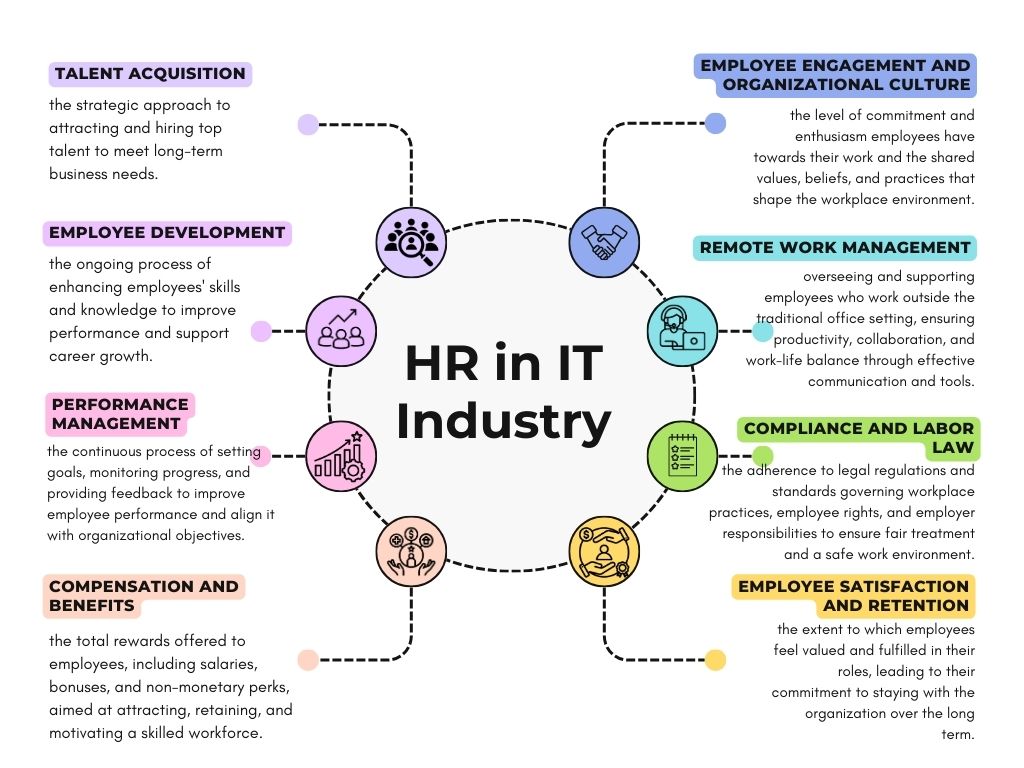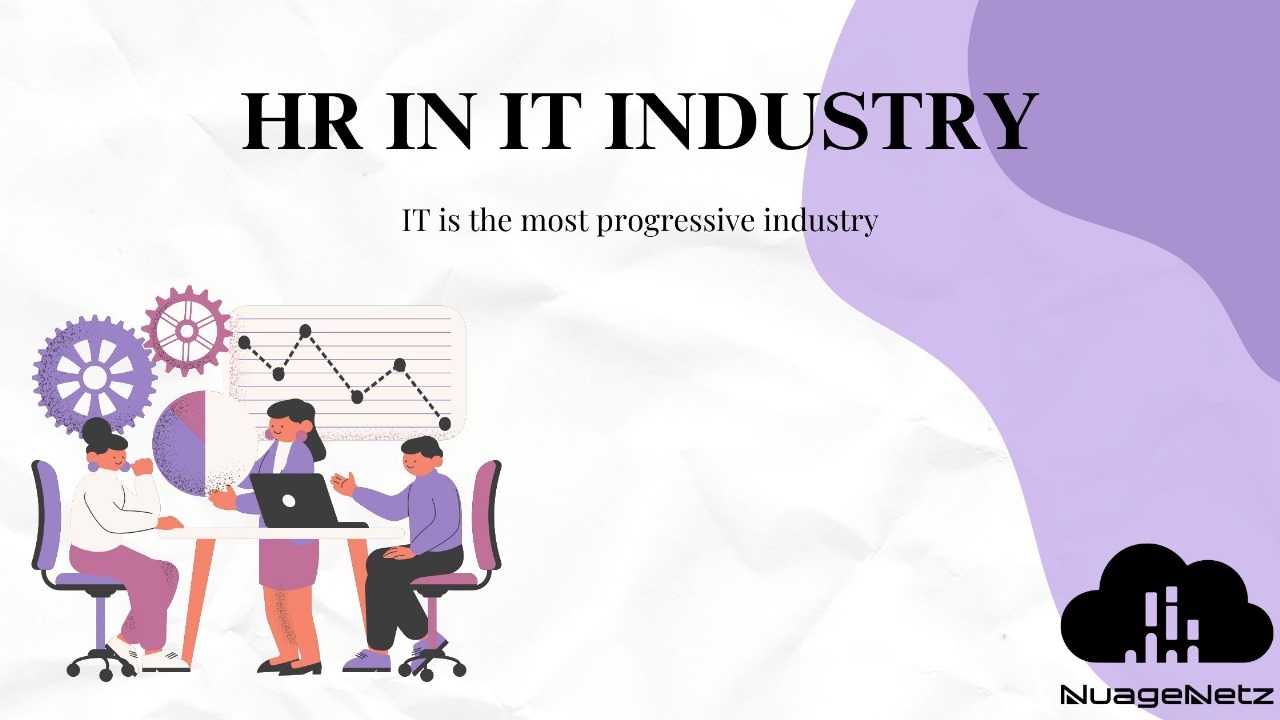Within the IT industry, Human Resources (HR) plays a vital role in managing an organization’s human capital. The mission of HR is to ensure that a business has the right workforce — one with the necessary skills and experience to drive success both now and in the future. Due to the rapidly evolving and competitive IT industry, HR functions seek primarily in these following areas:
TALENT ACQUISITION
- TECH TALENT RECRUITMENT: HR in IT are experts in finding people with specific practical competences from the very sophisticated ones (software development, cloud computing) to those that become necessity (data analytics, cybersecurity and AI). One of those top priorities, is the ability to recruit IT professionals; it is a very competitive market out there.
- EMPLOYER BRANDING: IT Companies to be Desirable Employers It does this by developing an image in areas like innovative leadership, employee welfare, career advancement and a fair compensation package.
EMPLOYEE DEVELOPMENT
- PRACTICE AND SKILL SET DEVELOPMENT: In today’s world where technology changes at a very fast pace, continuous learning is imperative in the IT industry. The HR is the department usually responsible for synchronizing regular training, certification programs and knowledge sharing sessions so that every employee remains abreast with the latest technologies and methodologies.
- CAREER PATH: IT has career paths from technical expert to leadership. HR outlines these paths and provides mentor or coaching programs to facilitate employee growth into them.
PERFORMANCE MANAGEMENT
- PERFORMANCE METRICS: The performance metrics can mainly be linked with project success, code excellence, creativity and problem-solving in IT industry. Human Resources develops performance assessment tools, which must be transparent in both design and application.
- FEEDBACK SYSTEMS: Agile methodologies demand ongoing feedback HR tools promote pulse checks, peer evaluations, and direction to improve employee productivity.

COMPENSATION AND BENEFITS
- COMPETITIVE COMPENSATION PACKAGES: Yes, quite true and it is not mandatory for all the IT Firms, but keeping in mind that such lucrative salary packages provide lucrative compensation incentives to experienced employees. Compensation is expected to be driven by HR based on a combination of market trends and company financials.
- EMPLOYEE BENEFITS: Health insurance, vacation time and other leave policies, ability to work at home or remotely as well as wellness programs help keep employees happy. IT companies may be proud of their flexible hours and free meals or tech equipment.
EMPLOYEE ENGAGEMENT AND ORGANIZATIONAL CULTURE
- DIVERSITY AND INCLUSION: HR in IT is working on this premise to get that diverse and inclusive workforce build where people are not only from various background but also feel respected. This often includes examining gender imbalances and nonpartisan hiring practices.
- ENGAGEMENT INITIATIVES: Research has shown that employee engagement is essential in a high-stress and fast-moving work environment such as IT. This is accomplished through initiatives such as the ones outlined here: Team buildings, hackathons, innovation contests with more frequent town halls may be organized by HR to ensure a culture of collaboration and motivation.
REMOTE WORK MANAGEMENT
- HYBRID WORK MODELS: On any given aspect of work practice, you would normally expect the IT industry led to adopt remote or hybrid work models. HR is tasked with policy creation, that collaboration tools are well integrated and company culture is kept alive in spite of physical distance.
- WELL-BEING: HR works to keep you from burning out by setting clear aims for your work/life balance and includes flexible scheduling, monitoring your workload.
COMPLIANCE AND LABOR LAW
- LEGAL COMPLIANCE: HR also takes care of legal compliance in the form of labor law, data privacy regulations or intellectual property protection, something very critical to tech projects due to their classified nature.
- GLOBAL WORKFORCE MANAGEMENT: It is the responsibility of HR to ensure compliance in multiple countries for multinational IT companies and manage issues such as cross-border employment, visas and different labor laws.
EMPLOYEE SATISFACTION AND RETENTION
- REDUCING TURNOVER: High employee turnover is almost a norm in IT, owing to travail, better offers or minimal professional growth. So, HR has the task of trying to dig through mountains of unwanted resumes, while uncovering the reasons a company is facing high turnover and what it can do to retain its valuable people, whether that means providing career development opportunities to them or rewards, or employee engagement programs, etc.
- EXIT INTERVIEWS AND REVIEWING: HR performs exit interviews to learn about why employees leave, and see how the employee experience can be improved through due analysis.
Conclusion
IT is the most progressive industry, which is why it requires HR to promptly adapt. Meeting the assignment of automatically staffing IT companies nowadays consists in attracting top talent and providing it with constant improvements, supporting a wellbeing work culture alongside technology that keeps its gears constantly revolving.
About Us
NuageNetz IT Services Pvt. Ltd. is a cutting-edge IT company that specializes in Cloud Computing, Web Development, DevOps and Agile Methodologies. Our team of skilled professionals is dedicated to providing exceptional services to our clients using the latest technologies and tools
Got Something to say about our Blog?
Have something to say? Drop your thoughts, feedback, or questions in the comments below!
